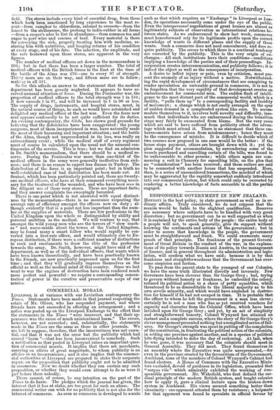COMMERCIAL MORALS.
LIVERPOOL is at variance with our Leviathan contemporary the Times. Statements have been made in that journal respecting the estate of Mr. Oliver, who has suspended payment, and whose friends have not succeeded in effecting an arrangement ; and a notice was posted up on the Liverpool Exchange to the effect that the statements in the Times "were incorrect, and that their ap- pearance was the cause of much unintentional harm." The errors, however, are not corrected ; and, substantially, the statements made in the Times are the same as those in other journals. We are left to suppose, therefore, that the incorrectness was not essen- tial, and that it was not the error but the publicity which had caused "harm "—that has been inconvenient to somebody. Such a notification as that posted in Liverpool raises an important ques- tion of commercial morals. It implies that there are merchants, carrying on affairs of great magnitude, to whom publicity is an offence or an inconvenience ; and it also implies that the commer- cial authorities at Liverpool are prepared to stake their corporate repute on the proposition that publicity ought not to be admitted in commerce. Now we doubt whether they can sustain any such proposition, or whether they would even attempt to do so were it put before them nakedly. There cannot, of course, be any intention on the part of the Times to do harm. The pledges which the journal has given, the interest that it has at stake, are too great for such an abuse. The commercial writer can wish for no publicity that is not also for the interest of commerce. As soon as commerce is developed to a scale such as that which requires an "Exchange " in Liverpool or Lon- don, its operations necessarily come under the eye of the public. Even the interpersonal negotiations of great houses are almost as legitimately subjects of observation as international relations be- tween states. As we endeavoured to show last week, commerce must henceforward rely for its legitimate profits upon the correct knowledge of wants in different places and the supply of those wants. Such a commerce does not need concealment, and does re- quire publicity. The errors to which there is a continual tendency are corrected by the publicity. This is the very origin of ex- changes. All such institutions have their conditions—conditions implying a knowledge of the parties and of their proceedings. In- corporation creates intercommunication, and publicity follows ; it is indeed the object as well as the consequence of incorporation. A desire to inflict injury or pain, even by criticism, must pre- sent the anomaly of an injury without a motive. Notwithstand- ing the rapid development of circumstances that are conspiring to render speculation an untenable ground in commerce, it is not to be forgotten that the very rapidity of that development creates an embarrassment for commercial men. The sudden flash of intelli- gence to the most distant part of the commercial world, which is a facility, "pulls them up' to a corresponding facility and lucidity of movement ; a change which is not easily arranged on the spur of sudden demand in a complicated system like ours. To accom- modate themselves to it, involves both novelty and difficulty, inso- much that individuals who are embarrassed during the transition stage may fairly be exonerated from blame. But the very cases which are said to have suffered from publicity attest the advan- tage which must attend it. There is no statement that these em- barrassments have arisen from misdemeanour' hence they must be the consequence of mistake. It is difficult to decide which of two courses now proposed in one case would be the better : if the house stops payment, others are brought down with it ; yet the plan suggested for accommodation, by surrendering some of the vessels purchased and cancelling certain of the bills, was found to be unfavourable to other persons ; while others again are com- mencing a suit in Chancery for cancelling bills, on the plea that no "consideration" has been received; and these suitors are said to be connected with another house that has suspended. Here, then, is a series of unconsidered transactions, the mischief of winch may be aggravated by the rapidity somewhat suddenly introduced into our commercial system, but which could only be corrected by rendering a better knowledge of facts accessible to all the parties engaged.


























 Previous page
Previous page